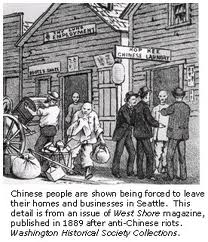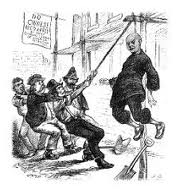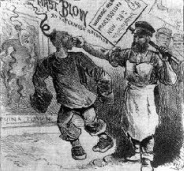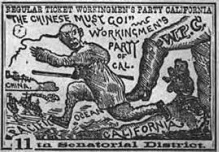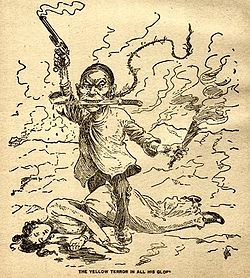Anti-Chinese Movement in the 19th Century
|
The cause for an anti-Chinese movement in America may be attributed to many factors - xenophobia, misconceptions, discrimination, exploitation, greed, etc.
Maybe a reason for an anti-Chinese movement in America is that Americans had a misconception about the Chinese. This was possibly worsened as many Chinese also did not view the United States as their homeland. Hoping to return one day to China after striking it rich on gold in California, many of the early Chinese who migrated to America neither spoke nor wish to learn English. In addition, most Chinese did not wish to assimilate into mainstream American society, deciding instead to live in tight, small communities or "Chinatowns". These attitudes, plus the willingness of Chinese to do the worst work at the least pay made the Chinese an easy target for people who already had a phobia against foreigners, particularly one who looked, dressed, and acted differently from themselves. An early example of this kind of prejudice against the Chinese was the passage in California of the Foreign Miners' License Tax laws in 1850 and 1852 (8) (9). These laws required miners who were not an American citizen to pay a monthly tax of three dollars (which was later increased to six dollars, and later lowered to four dollars). Although these laws applied to all immigrants, they especially singled out the Chinese immigrants because they could not become naturalized American citizens. Another incident of racial discrimination was the California Supreme Court decision in 1854 citing that Chinese were not allowed to testify as witnesses before the court against white citizens, including those accused of murder. In the case of "The People of the State of California v. George Hall" ("People v. Hall"), the decision was based upon an opinion that “...a race of people whom nature has marked as inferior, and who are incapable of progress or intellectual development beyond a certain point, as their history has shown; differing in language, opinions, color, and physical conformation; between whom and ourselves nature has placed an impassable difference and as such had no right to swear away the life of a citizen or participate with us in administering the affairs of our Government." (10) Anti-Chinese sentiments, particularly among the portion of white society represented by the lower levels, became even more pronounced as the economy in the United States worsened in the 1870's. Many whites felt depressed wages and the lack of jobs were a result of too many Chinese laborers or "coolies." Such groups like the Workingman's Party, led by racist Californian Denis Kearney, found support from many of the unemployed as his party led their attack against the Chinese immigrants with its famous slogan "The Chinese must go." (11) Newspaper articles also stirred up resentments toward the Chinese by writing rumors about the "yellow peril" and publishing satirical cartoons . When in 1909 the murder of Elsie Sigel in New York was reported by the news media , it portrayed Chinese men as preying upon young "innocent" white women. This resulted in an increasing harassment of Chinese communities across the United States (12). Rising tensions in America were later evidenced in the massacre in Los Angeles in 1871 (13) and the 1877 San Francisco riot (14). These along with other anti-Chinese demonstrations only increased the anxiety of many Americans towards the Chinese and made the populace more resolute towards finding a way not only to prevent Chinese immigrants from entering the United States, but to expel those Chinese already here. |

